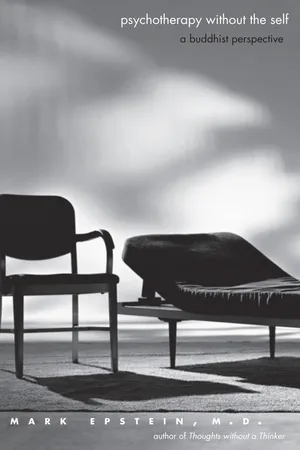
- 272 pages
- English
- PDF
- Available on iOS & Android
About this book
Insights on the interface between Buddhist teachings and Western psychotherapy by the best-selling author of Thoughts without a Thinker
Immersed in Buddhist psychology prior to studying Western psychiatry, Dr. Mark Epstein first viewed Western therapeutic approaches through the lens of the East. This posed something of a challenge. Although both systems promise liberation through self-awareness, the central tenet of Buddha's wisdom is the notion of no-self, while the central focus of Western psychotherapy is the self. This book, which includes writings from the past twenty-five years, wrestles with the complex relationship between Buddhism and psychotherapy and offers nuanced reflections on therapy, meditation, and psychological and spiritual development. A best-selling author and popular speaker, Epstein has long been at the forefront of the effort to introduce Buddhist psychology to the West. His unique background enables him to serve as a bridge between the two traditions, which he has found to be more compatible than at first thought. Engaging with the teachings of the Buddha as well as those of Freud and Winnicott, he offers a compelling look at desire, anger, and insight and helps reinterpret the Buddha's Four Noble Truths and centralconcepts such as egolessness and emptiness in the psychoanalytic language of our time.
Tools to learn more effectively

Saving Books

Keyword Search

Annotating Text

Listen to it instead
Information
Table of contents
- Contents
- Acknowledgments
- Introduction Toward a Buddhist Psychotherapy
- Part one: Buddha
- I. Meditative Transformations of Narcissism (1986)
- II. The Deconstruction of the Self Ego and “Egolessness’’ in Buddhist Insight Meditation (1988)
- III. Forms of Emptiness Psychodynamic, Meditative and Clinical Perspectives (1989)
- IV. Psychodynamics of Meditation Pitfalls on the Spiritual Path (1990)
- Part two: Freud
- V. Attention in Analysis (1988)
- VI. Beyond the Oceanic Feeling Psychoanalytic Study of Buddhist Meditation (1990)
- VII. Awakening with Prozac Pharmaceuticals and Practice (1993)
- VIII. A Buddhist View of Emotional Life (1995)
- IX. Freud and the Psychology of Mystical Experience (1996)
- Part three: Winnicott
- X. Sip My Ocean Emptiness as Inspiration (2004)
- XI. A Strange Beauty Emmanuel Ghent and the Psychologies of East and West (2005)
- XII. The Structure of No Structure Winnicott’s Concept of Unintegration and the Buddhist Notion of No-Self (2006)
- XIII. Meditation as Art, Art as Meditation Thoughts on the Relationship of Nonintention to the Creative Process (2006)
- Credits
- Index
Frequently asked questions
- Essential is ideal for learners and professionals who enjoy exploring a wide range of subjects. Access the Essential Library with 800,000+ trusted titles and best-sellers across business, personal growth, and the humanities. Includes unlimited reading time and Standard Read Aloud voice.
- Complete: Perfect for advanced learners and researchers needing full, unrestricted access. Unlock 1.4M+ books across hundreds of subjects, including academic and specialized titles. The Complete Plan also includes advanced features like Premium Read Aloud and Research Assistant.
Please note we cannot support devices running on iOS 13 and Android 7 or earlier. Learn more about using the app